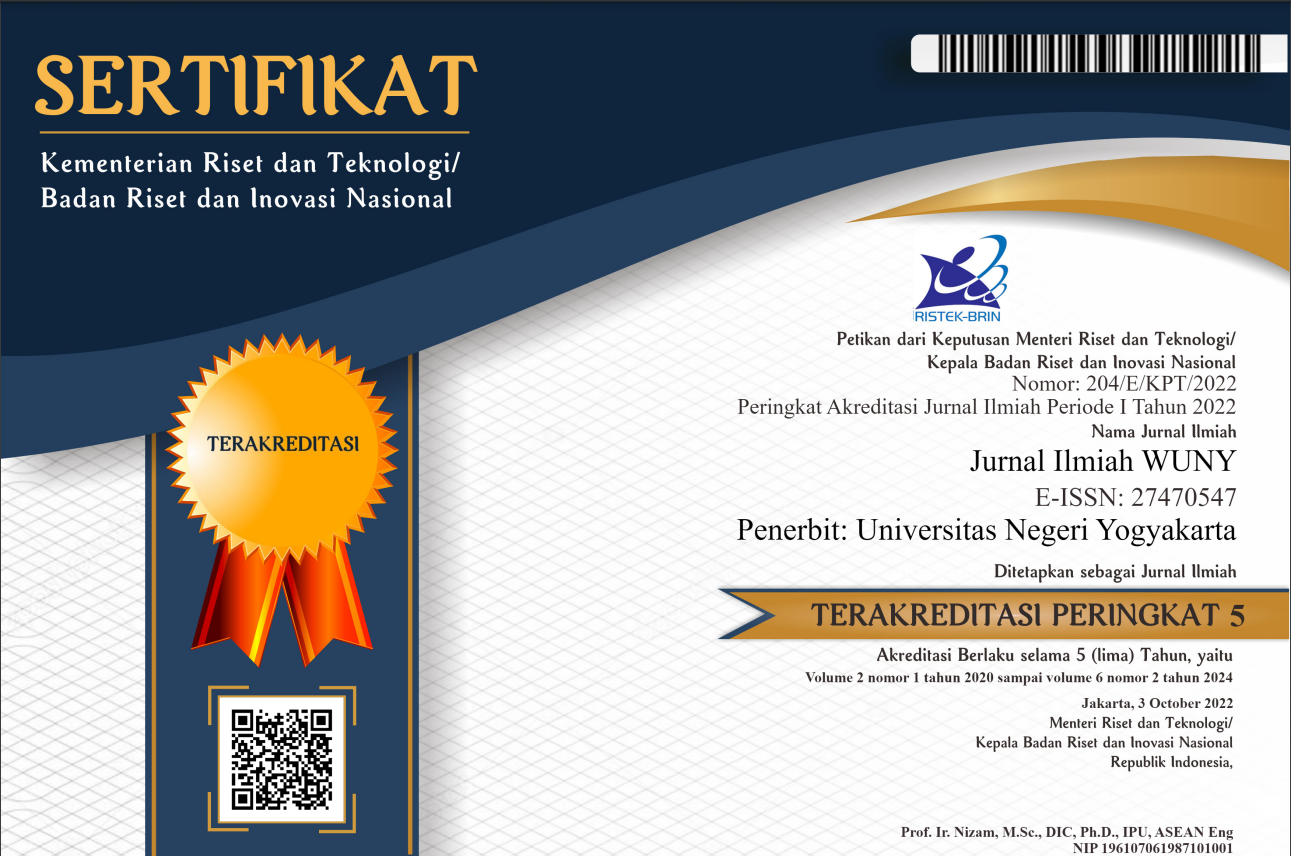Cultural shocks: understanding the impact on international students' academic journey at Yogyakarta, Indonesia
Shahzeb Shahzeb, Shah Abdul Latif University Khairpur, Pakistan
Abstract
Keywords
Full Text:
PDFReferences
Ahmed, R., Ahmed, A., Barkat, W., & Ullah, R. (n.d.). Impact of Scholarships on Student Success A Case Study of the University of Turbat, Pakistan. https://doi.org/10.30541/v61i2pp.231-258
Al-Raqqad, H. K., Al-Bourini, E. S., Al Talahin, F. M., & Aranki, R. M. E. (2017). The Impact of School Bullying On Students’ Academic Achievement from Teachers Point of View. International Education Studies, 10(6), 44. https://doi.org/10.5539/ies.v10n6p44
Arthur, N. (2017). Supporting international students by strengthening their social resources. Studies in Higher Education, 42(5), 887-994. https://doi.org/10.1080/03075079.2017.1293876
Baas, M. (2019). The Education-Migration Industry: International Students, Migration Policy and the Question of Skills. International Migration, 57(3), 221-234. https://doi.org/10.1111/imig.12540
Beech, S. E. (n.d.). International Student Mobility: the Role of Social Networks. https://doi.org/10.1080/14649365.2014.983961#abstract
Beiter, R., Nash, R., McCrady, M., Rhoades, D., Linscomb, M., Clarahan, M., & Sammut, S. (2015). The prevalence and correlates of depression, anxiety, and stress in a sample of college students. Journal of Affective Disorders, 173, 90–96. https://doi.org/10.1016/j.jad.2014.10.054
Blessing, O., & Patrick, O. (2020). EFFECTS AND REMEDIES OF CULTURE SHOCK ON HIGHER EDUCATION STUDENTS IN CHINA. European Journal of Research and Reflection in Educational Sciences, 8. www.idpublications.org
Darling-Hammond, L., & Cook-Harvey, C. M. (n.d.). Educating the Whole Child: Improving School Climate to Support Student Success. https://learningpolicyinstitute.org/product/educating-whole-child.
Denovan, A., & Macaskill, A. (2017). Stress and Subjective Well-Being among First-Year UK Undergraduate Students. Journal of Happiness Studies, 18(2), 505–525. https://doi.org/10.1007/s10902-016-9736-y
Ermiati, E., Widiasih, R., Suryati, Y., & Murtiningsih, M. (2021). Student experience in completing thesis and its implications for international students in indonesia. Open Access Macedonian Journal of Medical Sciences, 9(T6), 45–51. https://doi.org/10.3889/oamjms.2021.7367
Ernofalina, E. (n.d.). Culture Shocks Experienced by Indonesian Students Studying Overseas Ernofalina. Ernofalina, E. (2017). Culture Shocks Experienced by Indonesian students studying overseas. International Journal of Educational Best Practices, 1(2), 87-105.
Gao, H., & De Wit, H. (2017). China and International Student Mobility. International Higher Education, 90, 3. https://doi.org/10.6017/ihe.2017.90.9865
Gong, Y., Gao, X., Li, M., & Lai, C. (2021). Cultural adaptation challenges and strategies during study abroad: New Zealand students in China. Language, Culture, and Curriculum, 34(4), 417–437. https://doi.org/10.1080/07908318.2020.1856129
Grey, M. M., Wong-Wylie, G., Rempel, G. R., & Cook, K. (2020). Expanding qualitative research interviewing strategies: Zoom video communications. Qualitative Report, 25(5), 1292–1301. https://doi.org/10.46743/2160-3715/2020.4212
Jack, A. A. (2014). Culture shock revisited: The social and cultural contingencies to class marginality. Sociological Forum, 29(2), 453–475. https://doi.org/10.1111/socf.12092
Jones, E. (2017). Problematising and reimagining the notion of ‘international student experience'. Studies in Higher Education, 42(5), 933–943. https://doi.org/10.1080/03075079.2017.1293880
Lee, A. R., & Bailey, D. R. (2020). Examining the interactions of South Korean University Students with International Students. Asian Journal of University Education, 16(3), 43–58. https://doi.org/10.24191/ajue.v16i3.8622
Leong, P. (2015). Coming to America: Assessing the Patterns of Acculturation, Friendship Formation, and the Academic Experiences of International Students at a US College 5(4), 459–474. http://jistudents.org
Liang, X., Dibyamandala, J., & Mangkhang, C. (n.d.). Enhancement of Intercultural Communication Competence Through Chinese Food Culture in Chinese as a Foreign Language Teaching. In Journal of Multidisciplinary in Social Sciences (Vol. 18, Issue 2). http://jmss.dusit.ac.th
Lovanavalona, R. & Candy, A. (2016). INDONESIA SOFT POWER DIPLOMACY TOWARDS MADAGASCAR VIA EDUCATION AND CULTURAL EXCHANGE: DARMASISWA SCHOLARSHIP PERIOD.
Mesidor, J. K., & Sly, K. F. (2016a). Factors that Contribute to the Adjustment of International Students. 6(1), 262–282. http://jistudents.org/
Mesidor, J. K., & Sly, K. F. (2016b). Factors that Contribute to the Adjustment of International Students. 6(1), 262–282. http://jistudents.org/
Mohajan, H., & Mohajan, H. K. (2018). Munich Personal RePEc Archive Qualitative Research Methodology in Social Sciences and Related Subjects Qualitative Research Methodology in Social Sciences and Related Subjects. In Journal of Economic Development, Environment and People (Vol. 7).
Muharom Albantani, A., & Madkur, A. (2018). Think Globally, Act Locally: The strategy to incorporate local wisdom into foreign language teaching in Indonesia. International Journal of Applied Linguistics and English Literature, 7(2), 1. https://doi.org/10.7575/aiac.ijalel.v.7n.2p.1
Mukminin, A. (2019). Acculturative experiences among Indonesian graduate students in Dutch higher education. Journal of International Students, 9(2), 488–510. https://doi.org/10.32674/jis.v0i0.265
Mulbah, J. (2017). The EXPERIENCE OF CULTURE SHOCK AND ITS EFFECTS ON
Presbitero, A. (2016). Culture shock and reverse culture shock: The moderating role of cultural intelligence in the adaptation of international students. International Journal of Intercultural Relations, 53, 28–38. https://doi.org/10.1016/j.ijintrel.2016.05.004
Roostika, R. (n.d.). The Role of City and Host University Images on Students’ Satisfaction with the Assigned Destination. http://buscompress.com/journal-home.html
Vasileiou, K., Barnett, J., Thorpe, S., & Young, T. (2018). Characterising and justifying sample size sufficiency in interview-based studies: Systematic analysis of qualitative health research over a 15-year period. BMC Medical Research Methodology, 18(1). https://doi.org/10.1186/s12874-018-0594-7
Wang, C. Y. (2019). Building a Network for Preserving Intangible Cultural Heritage through Education: A Study of Indonesian Batik. International Journal of Art and Design Education, 38(2), 398–415. https://doi.org/10.1111/jade.12200
Wu, H., Garza, E., & Guzman, N. (2015). International Student’s Challenge and Adjustment to College. Education Research International, 2015, 1-4. https://doi.org/10.1155/2015/202753
Yang, Y., Zhang, Y., & Sheldon, K. M. (2018). Self-determined motivation for studying abroad predicts a lower culture shock and greater well-being among international students: The mediating role of basic psychological needs satisfaction. International Journal of Intercultural Relations, 63, 95–104. https://doi.org/10.1016/j.ijintrel.2017.10.005
Yılmaz, K., & Temizkan, V. (2022). The Effects of Educational Service Quality and Socio-Cultural Adaptation Difficulties on International Students’ Higher Education Satisfaction. SAGE Open, 12(1). https://doi.org/10.1177/21582440221078316
Young, T. J., & Schartner, A. (2014). The effects of cross-cultural communication education on the adjustment and adaptation of international students. Journal of Multilingual and Multicultural Development, 35(6), 547–562. https://doi.org/10.1080/01434632.2014.884099
DOI: https://doi.org/10.21831/jwuny.v6i1.72278
Refbacks
- There are currently no refbacks.
Copyright (c) 2024 Jurnal Ilmiah WUNY

This work is licensed under a Creative Commons Attribution-ShareAlike 4.0 International License.

This work is licensed under a Creative Commons Attribution-ShareAlike 4.0 International License
Supported by:











